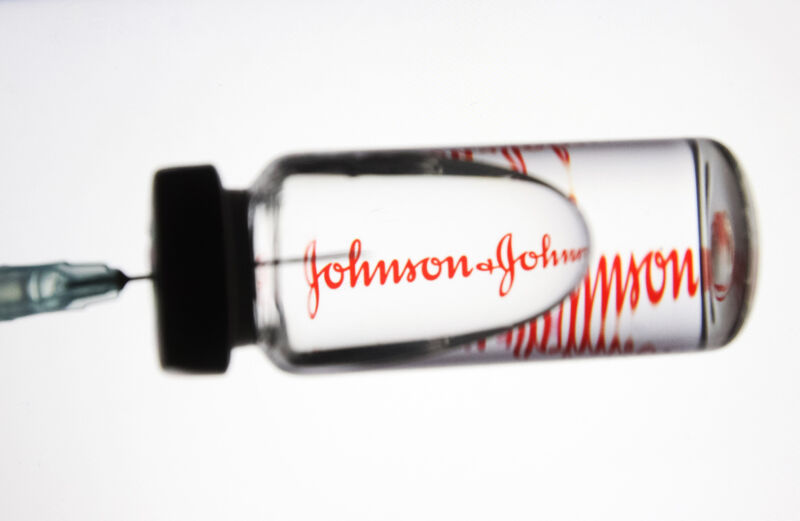
Johnson & Johnson’s experimental COVID-19 vaccine was 72 percent effective at preventing moderate and severe disease in the United States and 85 percent effective at preventing severe disease globally. But the one-shot vaccine struggled to fight off emerging virus variants in other countries, lowering its overall efficacy to 66 percent.
The topline results from Johnson & Johnson’s Phase III ENSEMBLE trial, announced Friday, suggest the vaccine will be yet another much-needed weapon against the pandemic virus, which has now infected over 100 million worldwide and killed nearly 2.2 million.
“Changing the trajectory of the pandemic will require mass vaccination to create herd immunity, and a single-dose regimen with fast onset of protection and ease of delivery and storage provides a potential solution to reaching as many people as possible,” said Mathai Mammen, global head of research and development at Janssen Pharmaceutical (owned by J&J). “The ability to avoid hospitalizations and deaths would change the game in combating the pandemic.”
But with 66 percent overall efficacy, it’s not a smash hit, and its lower efficacy against the variants will likely ratchet up anxiety about the virus’s swift evolution and our ability to reach herd immunity.
Trial
For the trial, J&J enrolled 44,325 adult participants in Argentina, Brazil, Chile, Colombia, Mexico, Peru, South Africa, and the United States. The trial looked for disease at 14 days and 28 days after vaccination. An interim analysis was triggered when 468 participants developed symptomatic COVID-19.
When it came to preventing moderate to severe COVID-19, the analysis suggested the vaccine’s efficacy was 72 percent in the United States, 66 percent in Latin America, and 57 percent in South Africa, 28 days after vaccination. Together, the data suggested an overall 66 percent efficacy, with 85 percent efficacy against severe disease.
(In the study, severe disease included laboratory-confirmed SARS-CoV-2 and one or more of the following: signs consistent with severe systemic illness, admission to an intensive care unit, respiratory failure, shock, organ failure, or death, among other factors. Moderate disease was defined as laboratory-confirmed SARS-CoV-2 and one or more of the following: evidence of pneumonia, deep vein thrombosis, shortness of breath or abnormal blood oxygen saturation above 93 percent, abnormal respiratory rate (≥20); or two or more systemic symptoms suggestive of COVID-19.)
The lower efficacy in countries outside the US suggests the vaccine struggled against variants that are rapidly spreading in them. In South Africa, for example, 95 percent of the COVID-19 cases were due to the 501Y.V2 variant (aka B.1.351), which is thought to be able to escape immune responses targeting past versions of the virus, including those first isolated in Wuhan, China, where the pandemic began. On Thursday, another vaccine developer, Novavax, announced its vaccine was 89 percent effective in the UK but just 49 percent effective in South Africa.
Vaccine
The J&J vaccine is an engineered adenovirus that carries a full, stabilized copy of the virus’s infamous spike protein, the blueprints of which were based on the first clinical isolate of the SARS-CoV-2 virus from Wuhan. Spike is the protruding club-like protein adorning the outside of the virus’s particle. The virus uses it to grab onto, enter, and infect human cells.
The adenovirus—Ad26—was isolated long ago in human stool samples and has been a successful vector for vaccines, notably used in a recently approved Ebola vaccine. Ad26 is generally seen as safe and good at prompting desired immune responses. This bore out in J&J’s trial, which found the vaccine had no significant safety concerns and was generally well-tolerated by participants. The adenovirus-based vaccine also offers relative convenience for vaccine distribution. Unlike the currently authorized mRNA vaccines that both require two shots and one of which requires ultra-cold storage conditions, J&J’s vaccine is a single shot that can keep for two years in a standard freezer and three months at standard refrigerator temperatures.
“These topline results with a single-shot COVID-19 vaccine candidate represent a promising moment,” Paul Stoffels, chief scientific officer at Johnson & Johnson, said in a statement. “A one-shot vaccine is considered by the World Health Organization to be the best option in pandemic settings, enhancing access, distribution and compliance. Eighty-five percent efficacy in preventing severe COVID-19 disease and prevention of COVID-19-related medical interventions will potentially protect hundreds of millions of people from serious and fatal outcomes of COVID-19.”
https://arstechnica.com/?p=1738256

